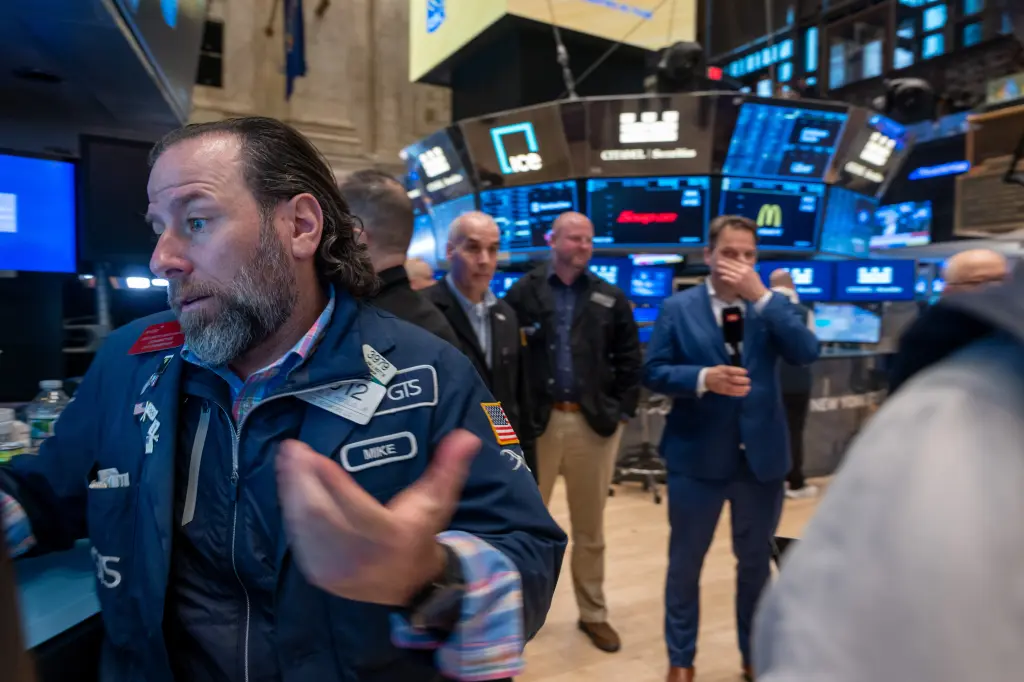Global shares plummeted on Wednesday. U.S. restrictions on chip sales to China and ongoing tariff uncertainty battered tech stocks. Gold traded at record highs, and support for the dollar continued to erode.
Washington issued new export licensing requirements. These requirements impacted sales of Nvidia’s H20 and AMD’s MI308 artificial intelligence chips to China. Nvidia said the move would cost it $5.5 billion; its shares slumped nearly 7%.
MSCI’s gauge of stocks across the globe fell about 1.5%.
Paul Christopher, a strategist with the Wells Fargo Investment Institute, wrote, “Capital markets remain caught between news about new tariffs and, on the other hand, about tariff negotiations or suspensions.”
The Dow Jones Industrial Average fell 1.7%. The S&P 500 dropped 2.2%, and the tech-heavy Nasdaq Composite slumped 3.1%.
U.S. Federal Reserve Chair Jerome Powell said the Fed would wait for more data on the economy’s direction before changing interest rates. He characterized recent market volatility as a logical processing of the Trump administration’s dramatic shifts in tariff policy.
Jamie Cox, managing partner for Harris Financial Group, said in an email, “Powell is doing what the rest of us are doing – waiting and watching. The Federal Reserve won’t act unless and until either the labor market turns or there is a systemic risk, such as a breakdown in the payment system.”
Data showed that U.S. retail sales surged in March. Households boosted purchases of motor vehicles ahead of tariffs, though concerns about the economic outlook hurt discretionary spending.
President Donald Trump ordered a probe into potential new tariffs on all imports of critical minerals on Tuesday. This is in addition to reviews into pharmaceutical and chip imports. Beijing reportedly ordered airlines to suspend deliveries of Boeing aircraft. They are continuing to play hardball.
EUROPE, ASIA SHARES DROP
European stocks fell. The STOXX 600 index, also hit by declining tech company shares, was down 0.2%.
U.S. stocks ended sharply lower on Wednesday. The Dow dropped 1.7%, the S&P 500 lost two-and-a-quarter percent, and the Nasdaq nosedived three percent.
MSCI’s broadest index of Asia-Pacific shares outside Japan fell 0.8%, snapping a four-day winning streak. Chinese blue chips rose 0.3%, as investors also digested some solid GDP data that pre-dated the tariff increases in April, but the Hong Kong Hang Seng index fell 1.9%.
Aneeka Gupta, economist and strategist at WisdomTree, said, “The broader focus still remains on tariffs.”
Gupta stated, “In China, we’ve had the restrictions raise concerns that access to global tech hardware would be further choked off. That’s also resulting in a bit of a risk-off sentiment in the market.”
The White House said Trump is open to making a trade deal with China. However, Beijing should make the first move.
The World Trade Organization sharply cut its forecast for global merchandise trade from solid growth to a decline on Wednesday. They said further U.S. tariffs and spillover effects could lead to the heaviest slump since the height of the pandemic.
TREASURIES FALL, GOLD GAINS
The uncertainties left gold in an unstoppable position. Bullion hit another record high of $3,339 per ounce, last up 3.5%.
Australian bank ANZ updated its forecast for gold to hit $3,600 an ounce by year-end on Wednesday. They said safe-haven demand for the asset would accelerate.
U.S. Treasury yields fell after comments from the Fed’s Powell stoked concerns about economic growth and inflation pressures.
The benchmark 10-year Treasury yield fell 4 basis points to 4.283%. Yields surged last week on concerns about the stability of the U.S. economy.
Traders of short-term interest-rate futures are betting the Fed resumes rate cuts in June. They also think that by year-end the policy rate, currently in the 4.25%-4.50% range, will be a full percentage point lower.
The U.S. dollar index slid 0.7% to around its lowest since April 2022. It tracks the currency against six peers, and the decline signals that investors remained cautious about U.S. assets.
The Japanese yen and Swiss franc rallied around 0.8% and 1.2%, respectively. People see them as safe assets during market turbulence.
The yen was trading around its highest level since September. The franc was at its highest in 10 years.
Bank of Japan Governor Kazuo Ueda told the Sankei newspaper that the central bank may need to take policy action if U.S. tariffs hurt the Japanese economy. He signaled the potential to pause the bank’s rate-hiking cycle.
Oil prices rose to a two-week high. The reason was concerns about global supplies after Washington issued new sanctions targeting Chinese importers of Iranian oil. Bitcoin added 0.5% to $84,389 in cryptocurrencies. It is down nearly 10% for the year.
Click here to read more on Finance and Investing.


